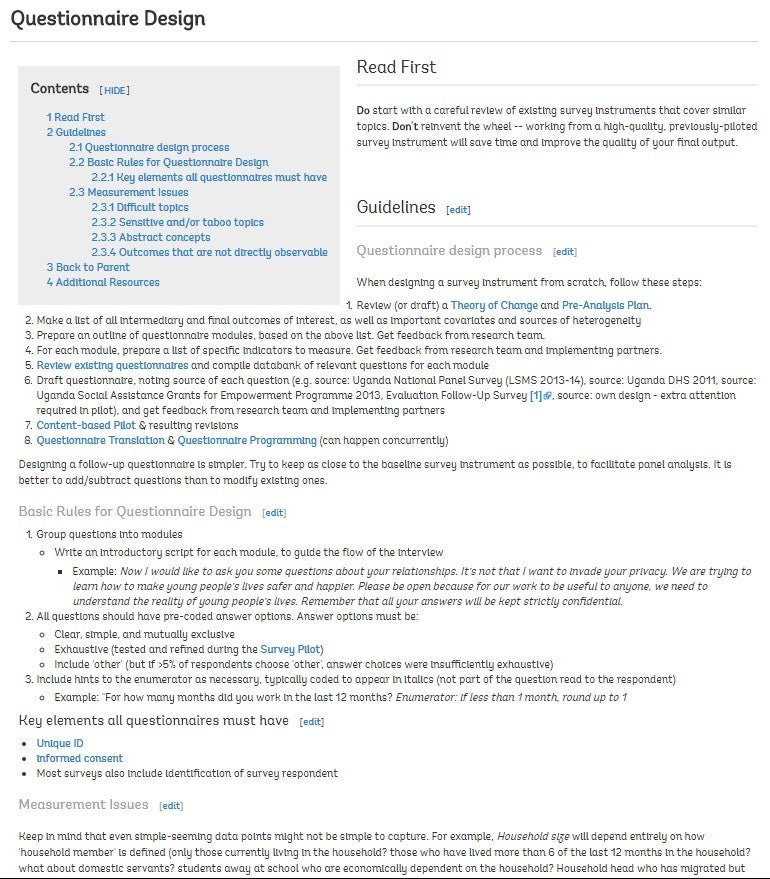This is a guest post by Maria Jones & Benjamin Daniels. Please see dimewiki.worldbank.org for more on the DIME Wiki.
In 1996, a time so long ago we can’t find the original speech online, then-President James Wolfensohn argued that the World Bank should henceforth become “ the Knowledge Bank”. Five years later, when it wasn’t yet considered a reputable source even for freshman essay citations, Wikipedia came online and changed the way knowledge is recorded and shared, forever. That was seventeen years ago on Jan 15, 2001, and today we’re proud to share that the World Bank is keeping up: the DIME Wiki is now the first public wiki ever launched on the World Bank’s official website.
We think the DIME Wiki fills a real knowledge gap. Right now, what do you do if you want to learn how to run an effective enumerator training? How do you prepare for a survey pilot? How do you decide what hardware and software to use for an electronic survey? Where do you turn for practical advice on data cleaning? DIME Analytics hosts an annual training on these topics, Manage Successful Impact Evaluations, that is always oversubscribed and attracts participants from all over the world. We’ve found in preparing course content and talking to participants that there is no current source for resources on all stages of the impact evaluation lifecycle, and that many of the resources out there are either proprietary or out-of-date. Materials from that training are consistently in the top search results for queries like “how to pilot a household survey”, and we often get emails requesting details on the same. So we created the DIME Wiki as a one-stop shop for practical resources on impact evaluations.
The Wiki includes existing resources where available (there are lots of great resources out there, especially on research design), and hosts new content where we didn’t find much publicly available. We particularly focused new content on the “black box” of implementation and fieldwork that comes between design and publication – how to actually get this kind of project into (and out of!) the field. Unlike a paper manual (or, sadly, this blog), the Wiki is fully searchable. The wiki is also interactive: members can access and edit every page, and even create new ones. It is targeted to all researchers and M&E specialists at the World Bank, clients who are managing data collection efforts in the field, donor institutions, universities, NGOs and governments. And we’ve put in place a quality assurance system: the simple account creation form requests for job title and professional affiliation (to prevent fake accounts), and a small team of Wiki admins monitor contributions from new users.
The Wiki home page is organized around four primary phases in the impact evaluation life-cycle: research design, data collection, analysis, and publication. In each category, there are a list of primary articles, which the branch off to provide increasing detail. For example, under Data Collection, the article on “Questionnaire Design” provides overall guidelines on the design process, basic rules to follow, and a summary of key measurement issues. That page in turn leads to articles on questionnaire translation, piloting, programming, and types of response errors. The sub-article on piloting links to a checklist to use to prepare for a survey pilot, and so on. Sub-articles on measurement link to previous blogposts from Development Impact, e.g. list experiments and recall bias.
Cross-cutting resources focus on advice for immediately operationalizing the more abstract articles, with concrete code examples and ready-for-field (printable) checklists. For example, Randomization in SurveyCTO notes that randomization in SurveyCTO is not best practice because of lack of reproducibility, and gives extensive code examples on how to accomplish this in Stata instead. Other pages, like ieduplicates, provide extensive documentation for quality-assurance code packages we have authored. But there remains much outside of our experience – for example, while we know there are more statistical software tools than Stata and R, current wiki editors don’t have enough experience with them to give practical advice.
And, of course, we don’t know what we don’t know. The strength of the Wiki from here on out will depend on developing a broad, active user-base from the broader development economics community. That’s where you come in. It’s easy to create an account, and here are tips on how to contribute. We welcome contributions of all types: add a link to a useful paper, supplement content in an existing article, or create an entirely new page. All it takes to create a new page on a wiki is to [[link]] to a page that doesn’t exist yet – and start writing!



In 1996, a time so long ago we can’t find the original speech online, then-President James Wolfensohn argued that the World Bank should henceforth become “ the Knowledge Bank”. Five years later, when it wasn’t yet considered a reputable source even for freshman essay citations, Wikipedia came online and changed the way knowledge is recorded and shared, forever. That was seventeen years ago on Jan 15, 2001, and today we’re proud to share that the World Bank is keeping up: the DIME Wiki is now the first public wiki ever launched on the World Bank’s official website.
We think the DIME Wiki fills a real knowledge gap. Right now, what do you do if you want to learn how to run an effective enumerator training? How do you prepare for a survey pilot? How do you decide what hardware and software to use for an electronic survey? Where do you turn for practical advice on data cleaning? DIME Analytics hosts an annual training on these topics, Manage Successful Impact Evaluations, that is always oversubscribed and attracts participants from all over the world. We’ve found in preparing course content and talking to participants that there is no current source for resources on all stages of the impact evaluation lifecycle, and that many of the resources out there are either proprietary or out-of-date. Materials from that training are consistently in the top search results for queries like “how to pilot a household survey”, and we often get emails requesting details on the same. So we created the DIME Wiki as a one-stop shop for practical resources on impact evaluations.
The Wiki includes existing resources where available (there are lots of great resources out there, especially on research design), and hosts new content where we didn’t find much publicly available. We particularly focused new content on the “black box” of implementation and fieldwork that comes between design and publication – how to actually get this kind of project into (and out of!) the field. Unlike a paper manual (or, sadly, this blog), the Wiki is fully searchable. The wiki is also interactive: members can access and edit every page, and even create new ones. It is targeted to all researchers and M&E specialists at the World Bank, clients who are managing data collection efforts in the field, donor institutions, universities, NGOs and governments. And we’ve put in place a quality assurance system: the simple account creation form requests for job title and professional affiliation (to prevent fake accounts), and a small team of Wiki admins monitor contributions from new users.
The Wiki home page is organized around four primary phases in the impact evaluation life-cycle: research design, data collection, analysis, and publication. In each category, there are a list of primary articles, which the branch off to provide increasing detail. For example, under Data Collection, the article on “Questionnaire Design” provides overall guidelines on the design process, basic rules to follow, and a summary of key measurement issues. That page in turn leads to articles on questionnaire translation, piloting, programming, and types of response errors. The sub-article on piloting links to a checklist to use to prepare for a survey pilot, and so on. Sub-articles on measurement link to previous blogposts from Development Impact, e.g. list experiments and recall bias.
Cross-cutting resources focus on advice for immediately operationalizing the more abstract articles, with concrete code examples and ready-for-field (printable) checklists. For example, Randomization in SurveyCTO notes that randomization in SurveyCTO is not best practice because of lack of reproducibility, and gives extensive code examples on how to accomplish this in Stata instead. Other pages, like ieduplicates, provide extensive documentation for quality-assurance code packages we have authored. But there remains much outside of our experience – for example, while we know there are more statistical software tools than Stata and R, current wiki editors don’t have enough experience with them to give practical advice.
And, of course, we don’t know what we don’t know. The strength of the Wiki from here on out will depend on developing a broad, active user-base from the broader development economics community. That’s where you come in. It’s easy to create an account, and here are tips on how to contribute. We welcome contributions of all types: add a link to a useful paper, supplement content in an existing article, or create an entirely new page. All it takes to create a new page on a wiki is to [[link]] to a page that doesn’t exist yet – and start writing!
Figure 1: DIME Wiki Homepage

Figure 2: Article on Questionnaire Design

Figure 3: Example Checklist



Join the Conversation